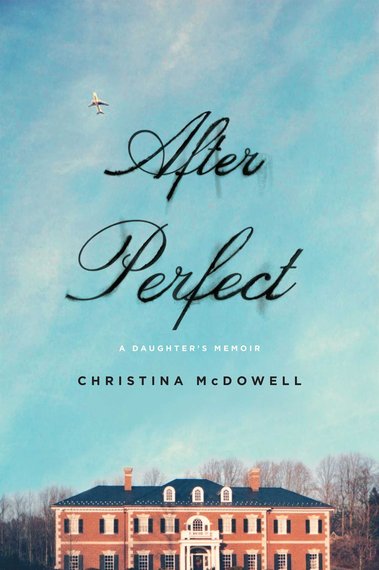I am lucky to have a number of friends who have written powerful memoirs and now can expand the brag to include a young woman I've known since she was in second grade and who has told her story in a book that I predict will light up this summer.
After Perfect, by Christina McDowell, came about after Christina wrote a furious blog addressed to the makers of The Wolf of Wall Street for the glamorous portrayal of master con man Jordan Belfort. Christina wrote that her own father was an associate of Belfort's and himself ended up in federal prison, bankrupting his family. The blog went viral and Christina got a book contract that allowed her to spend a year writing her story without having to hold down two jobs to pay her rent.
After Perfect is a wonder -- a story of a dramatic plunge from the heights of crazy '80's and 90's wealth in Washington DC to a hardscrabble existence in LA's young Hollywood as a fledgling actress/bartender/ waitress. And the slower falling of the scales from her eyes as she realizes her father will not only never be able to put her world back together, but that it was a world that was never quite real in the first place.
As a friend of the family, I was witness to this sudden fall from grace -- the mansion in McLean, the private plane, the home in Nantucket, the swat team-style arrest, the trial, the prison sentence and then the ignominy of the new life in LA defined by the absence of everything from before and a new, grueling focus on every bill, every rent check, every tip, every penny.
The story is as much Christina's relationship with money as it is with her father, her past, her identity. Having so much to having very, very little without having the tools to manage either. She successfully dodges the poor little rich girl label by being harder on herself than any reader will be.
The payoff comes as she figures out that no parent is going to rescue her -- she must raise herself. As she comes to grips with what happened to her she also takes responsibility for what she did to herself - a tough path of accountability that includes sobriety, writing and staying involved with the community of healing that embraced her.
Redemption is found in helping others - her description of going to a tough California prison to tell inmates what it's like to be the child of someone incarcerated is bracingly told.
This is also the story of a daughter's ultimate disillusionment with a father who called her his princess, his bambina, his movie star -as she comes to terms with false hope, falsehoods, and eventual abandonment. What follows is her realization that this eternal optimist, personal cheerleader and someone who loves her deeply is also a person whom she comes to believe is the ultimate con man.
I know this book will be painful for Christina's family to read. I also believe her mother did the best that she could to help Christina and her continued support of this effort to make sense of what happened is admirable.
My strongest feeling as I have helped Christina in a very small way to articulate her original blog and this book is to be deeply proud of her. As the recovery community likes to say, she did the work. You'll see.
I recently interviewed Christina:
Nancy Doyle Palmer: Talk about the feelings that compelled you to write the blog about The Wolf of Wall Street - it clearly triggered something in you?
Christina McDowell: Post Traumatic Stress Disorder is a strange thing and it can come out of nowhere. A week before Christmas of 2013 a friend of mine sent me a review in The New Yorker panning The Wolf Of Wall Street. She knew my story and thought I would enjoy it and we could laugh about it together. But I had no idea that the film was about Jordan Belfort and his company Stratton Oakmont, Inc. I had ignored the press about the film because Leonardo DiCaprio's character reminded me so much of my father--even his physical appearance. And my relationship with my father was still one I felt deeply hurt by, and was, on a daily basis trying to heal from. So when I read the article and I saw the names Jordan Belfort and Stratton Oakmont, my body had a physical reaction, memories came flooding back and my PTSD was triggered. I had remembered the name from my father's trial in New York City and the article in The Washington Post about him. I couldn't understand-- on sheer principle -- how a director as influential as Martin Scorsese would choose to make a film about a man who had hurt so many people and exclude the victims.
After my letter went viral, I received an email from the son of a man who was connected to Jordan Belfort who also went to prison for fraud. He told me he suffered from multiple panic attacks after seeing billboards everywhere. He's just a teenager. I received many more emails like that. And so, in my opinion, Scorsese, the producers, and the writer failed in that respect, and whether they realized it or not, it became this glorification of greed, opening wounds for many people. Fraud has a ripple effect on many -- including the children of those who committed the crime, and most people don't think about that. I felt an obligation to stand up for others and myself who were victims of fraud in this country. I had an opportunity to do that and I took it.
NDP: Did your feelings about your father change as you went through the process of writing the book?
CM: My feelings about my father always ebb and flow. It will be that way for the rest of my life and I am in acceptance of that now. I learned that it is possible to forgive someone and not be in contact with them, which I never knew was possible until I entered grief recovery. But it doesn't mean that the anger and sadness don't come up anymore. Writing about my childhood was the most difficult part of writing my book because memory can trick you into wanting to remember only the good to the point where the memory turns into fantasy or euphoric recall. It was my intention to write and describe my memories of my childhood in a fantastical way because most of the time it is how I remember them, or want to remember them. But it doesn't make it the whole truth, and I have to be careful because that's how denial can become insidious.
NDP: What have you learned about the difference between having a lot of money and having very, very little?
CM: I've learned that it is rarely ever about the money. Money will not fix your problems, will not make you happy, will not boost your self worth, or make you more loveable. That is an illusion. However, that being said, having money certainly provides more opportunity. I don't have a lot of money today, but I do have a background of affluence whether that was founded on truth or not. And I have resources--meaning, because of the community in which I was raised, the education I had, the relationships I cultivated over time, I have more access to people, places and things than someone who may not come from a similar background. And on a more fundamental level, I can walk across the street to the farmer's market and get fresh vegetables. There are people in this country--America--who don't even have access to healthy food. There are millions of people out there who do not have either the resources or money, and it's important that those who have or have had affluence and privilege acknowledge that.
NDP: What do you say to critics who will raise the 'poor little rich girl' aspects of your story?
CM: Everyone is entitled to his or her opinion. My story and my journey are my own and I'm sure it will resonate with some people and not with others. I don't mind owning the "poor little rich girl" title because in many ways I am. But, it doesn't make my pain any less real or my experience with betrayal and loss any less valid. Of course, I hope the take away here is that it is not about money, but about family values, love, forgiveness and the most important: accountability-- being responsible for our own actions and the choices that we make. We're powerless over the cards we're dealt. But it is up to us and only us what we do with them.
NDP: Would you recommend losing everything to others?
CM: It depends on what you mean by everything. There are losses that are emotional, mental, and spiritual--losing a loved one; I would never wish that kind of loss on anyone. Losing everything can certainly ignite change. For me being fully self-supporting and independent from my parents was empowering. It gave me confidence, self-esteem, a belief in myself I never had before and I'm grateful for that. I think it becomes an issue of accountability and responsibility. I hesitate to make any broad statements because I know that every situation is different, but today I really do believe that no one should be exempt from the working world based on someone else's financial success.
NDP: How does forgiveness factor into your story and your life today?
CM: For me, forgiveness is a daily practice. I don't believe an individual just wakes up one day and suddenly all is forgiven. Forgiveness takes work. When an individual has been betrayed on such a deep level you never forget the pain it caused you, but you can practice compassion and empathy for the person who hurt you with the understanding that we are all human, some are just sicker than others. And then, of course, you must learn to forgive yourself. I have to forgive myself constantly when resentment creeps up because it doesn't serve me or anyone else to place blame. I only end up hurting myself. My ability to forgive has brought real joy and happiness back into my life.
NDP: Do you think you were eventually rescued or did you rescue yourself?
CM: I don't believe anyone has the ability to save someone. That was a harsh lesson I had to learn. Personal change is an inside job. I saved myself. However, I did it by losing my ego and asking for help. Change means getting humble and having the willingness to shut up and listen sometimes. I have a therapist and different mentors who have been instrumental in my personal growth. If anything, writing is what saved me. Writing is like magic in that you can make great discoveries venturing onto that blank page. I learned more about myself from writing than I thought was humanly possible. I started writing eight years ago and it provided real relief from the pain I was experiencing.
NDP: What would you say is the biggest change in you since all of this happened?
CM: I wouldn't even go as far as saying that I've changed. It was more about finding my way back to my true self-- my eleven-year-old self who was authentic. Only now I have layers of character and depth; a person who has experienced loss and because of it, has a less sheltered and a more open view of the world. I can, however, survive on very little, and I am not attached to anything materialistic anymore; cars, clothes, jewelry... well, maybe my vintage typewriters, I'm pretty attached to those!


